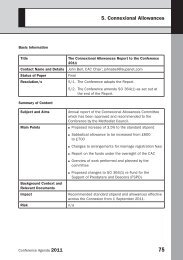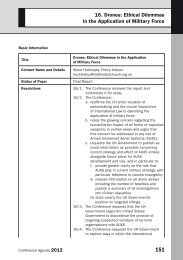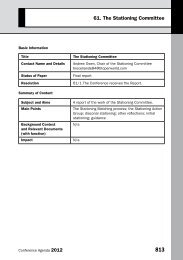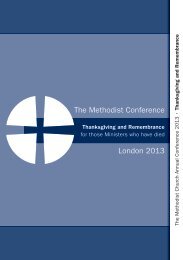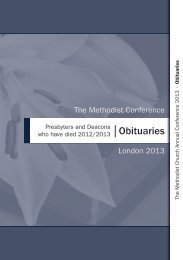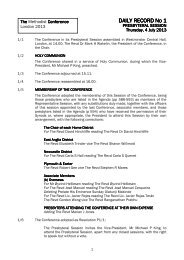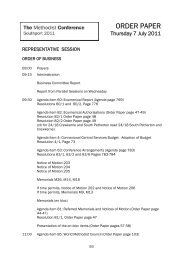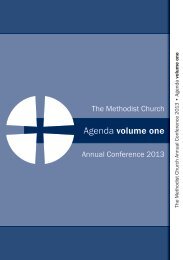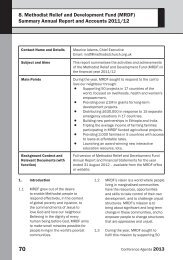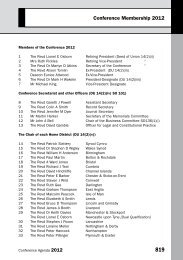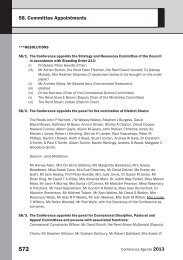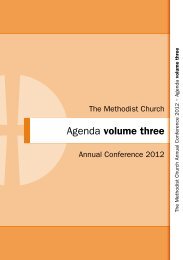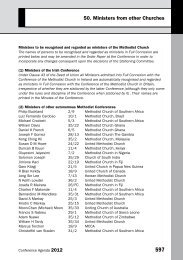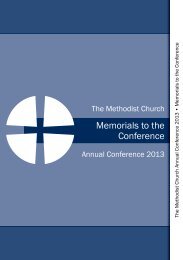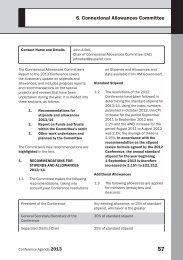Agenda Volume 2 - Methodist Conference
Agenda Volume 2 - Methodist Conference
Agenda Volume 2 - Methodist Conference
Create successful ePaper yourself
Turn your PDF publications into a flip-book with our unique Google optimized e-Paper software.
42. Ministries Committee<br />
development. The content of the<br />
course will take account of the<br />
diverse and developing range of<br />
contexts across inherited, emerging<br />
and fresh expressions of church.<br />
3.5 Resources for eight core modules,<br />
four of which will be core for Worship<br />
Leader training, are to be built<br />
around a reflective cycle framework,<br />
and will involve a mix of individual<br />
study, group discussion and practical<br />
application of learning. At present,<br />
study will run alongside practical<br />
experience in circuit. Modules will<br />
be flexible, supporting delivery in a<br />
range of contexts, including local<br />
peer- or tutor-led small groups,<br />
regional study days, and intensive<br />
courses (both residential and nonresidential).<br />
It is anticipated that<br />
students will have a choice with<br />
regard to delivery options. Existing<br />
‘alternative routes’ can continue to<br />
offer provision, and the process for<br />
students seeking APEL (Accreditation<br />
of Prior Experience and Learning) will<br />
be improved.<br />
3.6 It is anticipated that core resources<br />
will initially be made available online<br />
at Easter 2014, with hard copy<br />
provision to follow in 2015. A training<br />
package will be provided for new and<br />
existing tutors and mentors, and a<br />
generous period of time (three-four<br />
years) will be allowed for transition<br />
from Faith & Worship. Existing Local<br />
Preachers in training on the current<br />
Faith & Worship course may choose<br />
to complete Faith & Worship, or<br />
transfer to the new pathway, with<br />
credit given for Faith & Worship<br />
sections completed. The workshops<br />
to be held at the 2013 <strong>Conference</strong><br />
will provide an opportunity to find out<br />
more about the new pathways.<br />
4. Local Pastoral ministry<br />
4.1 The General Secretary’s Report to<br />
the 2011 <strong>Conference</strong> noted that<br />
there are significant issues involved<br />
in the exploration of local pastoral<br />
ministry. The issues which were<br />
identified included the following; the<br />
appropriate place of sacramental<br />
ministry within patterns of local<br />
pastoral ministry; the appropriate<br />
relationship between patterns of<br />
local pastoral ministry and the<br />
ordained and itinerant ministries of<br />
the Church; links with the theology<br />
and practice of <strong>Methodist</strong> Partner<br />
Churches and partner denominations<br />
and locally-coordinated ministries<br />
in fresh expressions and fellowship<br />
groups; oversight, accountability and<br />
supervision; and the theology of local<br />
ministry.<br />
4.2 As part of the joint commitment of<br />
the Ministries Committee and the<br />
Faith and Order Committee to take<br />
forward work inspired by the General<br />
Secretary’s Report, in October 2011,<br />
the Ministries Committee, at a joint<br />
meeting with the Fresh Ways Working<br />
Group, set the terms of reference of<br />
the Local Pastoral Ministry Resource<br />
Group. The resource group met<br />
twice, for two days at a time, in<br />
September and December 2012.<br />
In preparation for these meetings,<br />
<strong>Conference</strong> <strong>Agenda</strong> 2013<br />
483



